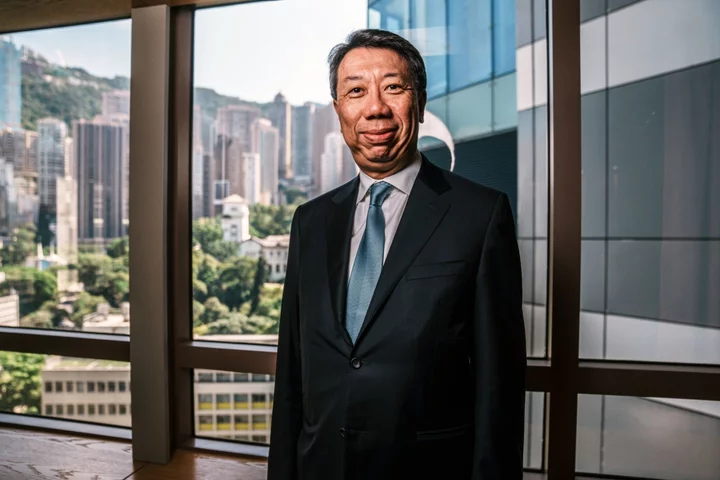Standard Chartered Plc’s Asia Chief Executive Officer Benjamin Hung is convinced the Chinese wealth spigots will keep on flowing.
It won’t be smooth, but the trajectory of China’s markets continuing to open is clear even as challenges mount at this “moment in time,” Hung, 59, said in an interview in Hong Kong, the bank’s biggest market.
Standard Chartered, a London-based bank geared toward emerging markets, is heavily exposed to the Greater China region. Like other global lenders, StanChart has to navigate a deteriorating geopolitical climate, and slowing growth, that has prompted Wall Street firms including Goldman Sachs Group Inc and Morgan Stanley to scale back on ambitious plans in China.
Amid such tensions, increasingly, China has been trading with other Asian countries. Banks including Singapore’s second-largest lender, Oversea-Chinese Banking Corp., are targeting such flows, to capitalize on shifting supply chains. Standard Chartered is looking to bank on this too.
“What you’re seeing is that fundamental need of Chinese wealth looking for a way to diversify,” said Hung, adding that companies are also looking to spread investments. China to Asean cross-border income at the bank grew 82% in the first half of the year, reflecting the trade flow shifts.
The mood toward China has turned bearish as its economy sputters, pushing the yuan toward a 16-year low. Foreign investor sentiment has also soured as President Xi Jinping’s willingness to sacrifice economic priorities for security concerns rock the private sector and throttle dealmaking.
The broad direction is that “they have to open up,” said Hung, adding that the speed will be “calibrated” and depend on considerations such as China’s reserves and the strength of its currency. To Hung, the challenges facing China are “cyclical” rather than structural.
With China and Hong Kong accounting for $1.2 billion, roughly 37.6% of the bank’s total pretax profit during the first half, there’s plenty at stake. The lender is pushing ahead with a plan to invest $300 million in China by 2024.
Veteran Banker
The 30-year veteran at the bank took over as the chief for Asia during the pandemic in 2021, helming a region that accounts for $2.7 billion, or more than 80%, of bank’s first half pretax profit. He’s seen the bank through cycles since returning to the region.
He worked his way up the ranks in a wide range of roles, from investor relations to retail and corporate banking to heading up the North Asia region. Hung oversees 21 markets in Asia, including smaller markets such as Cambodia.
“I’ve been back long enough that the road is, has always been bumpy,” said Hung. “There are some blowups always somewhere.”
The lender operates out of two hubs in Asia, Hong Kong and Singapore. Of the two, Singapore has the larger headcount with 9,000 people, and is also home to regional and global roles. Hung is based in Hong Kong where the bank has a bit more than 6,000 staff.
As China and the Chinese territory reopened earlier this year, Standard Chartered saw new account openings among affluent clients triple in Hong Kong. The global wealth business hauled in an operating income of $1 billion as net new money more than doubled to $12.9 billion.
While banks are laying off staff, StanChart is still hiring and faces a shortage of relationship managers and staff in sustainability and digital, according to Hung.
“If you see prospects, we also want to invest,” he said, adding that the bank is also finding “surplus areas” to streamline.
The country where it has the biggest headcount is India, and Hung is bullish on the subcontinent’s prospects. “I’m a big believer in a South Asia led by India. I think this is actually India’s decade,” he said, adding that India is structurally like China 10 to 15 years ago.
Middle East
Hung, who visited the Middle East three times this year, also sees a “huge amount” of money flowing between China and the region as Chinese companies expand. He is a member of the Hong Kong Chief Executive’s Council of Advisers and was part of a delegation for John Lee’s first official visit to the Middle East this year.
Asset managers and sovereign funds from the rich oil states are currently “very underweight” Asia and China and need to find a home to invest their money. “If you are currently underweight certain areas, then naturally more and more money will be rebalanced,” said Hung.
Standard Chartered itself could emerge as a target for Middle Eastern money. First Abu Dhabi Bank PJSC has explored a potential bid for the company, Bloomberg reported at the start of this year. The bank said in February it had considered an offer but wasn’t currently doing so, which means it can’t make another takeover approach for six months, except under certain circumstances.
Hung said that he didn’t meet with First Abu Dhabi Bank when he was in the Middle East and when asked if he sees the First Abu Dhabi Bank bid coming back, said: “You have to ask them.”
Chief Executive Officer Bill Winters “asked me to make sure I deliver on the potential in Asia and that’s what I’m focused on,” said Hung. “My simple view is I see a lot of potential in this franchise.”

